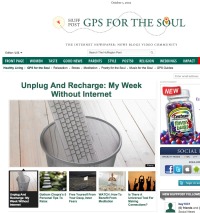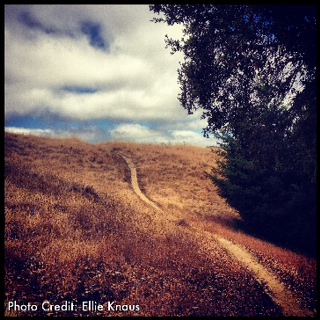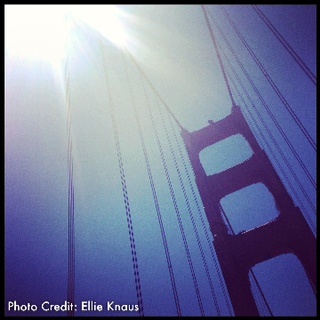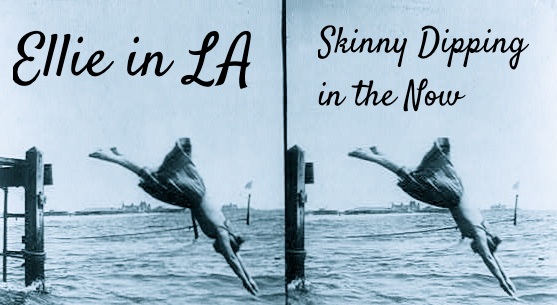Unplug to Recharge! My Week without Internet
 Wednesday, October 24, 2012 at 11:26AM
Wednesday, October 24, 2012 at 11:26AM 
Originally posted on The Huffington Post 10/01/12
Read my first two posts in this series:
"Signing Up to Face My Fear: Seven Days of Silence" and "Winning the Quiet Game With My Mind."
Per the rules of the weeklong silent meditation retreat, talking wasn't the only thing we'd agreed to give up. We'd vowed to experience life without our creature comforts (books, music, lovemaking) and numbing agents (television, radio, booze) and begin the process of finding sanctuary within ourselves. There was one more sacrifice I felt twitchy just thinking about: no Internet for seven days. It turns out I had inadvertently signed up for Cyber Rehab.

I logged onto my social media sites. Someone had left a Facebook comment about my retreat. Feeling vulnerable in this new place, I got a little thrill at being remembered and wondered what kind of encouragement the universe was about to bestow upon me. The comment read:
"You, quiet? You must have had to wire your mouth!"
I can see it as good-natured teasing now, but at the time, it stung. Wire my mouth? We hadn't talked in 10 years and the commenter had posted from 5,000 miles away. I can handle being the Village Idiot, but a Global Idiot? Thanks, social media. I swiped off my iPhone... which, by the way, isn't nearly as satisfying as the good old-fashioned phone slam. Later, I turned it back on, but only to text home that I was alive and to stare at pictures of my dog.
"There is something inherently insecure about our view of self," says Spirit Rock teacher Howard Cohn. The Bible blames Adam and Eve. I blame middle school. Unlike Eve, I know I look pretty good naked, but look into my eyes, and I'm afraid of what you'll see. Social media profits on this insecurity. In this new age of self-branding, we're offered platforms to project flattering one-dimensional versions of ourselves. And then, we're given tools to calculate our popularity. No wonder we're a mess.
Touching on the Buddhist concept of personality view, Howard says, "This version of yourself that plays in your mind, it's a description of someone who does not exist. It's an imaginary you." Our egos are storytellers. We should be nicer to ourselves for always having to put up with them. It's so easy to get caught up in the drama of who we think we are and who we imagine others to be. Show me an Instagram photo of Sunday brunch or pedicured toes in the grass, and I'll feel lazy about the box of cereal I'm eating and wonder if I should get my hairy big toes waxed. I'll gently remind myself, "I am enough." But my comparing mind loves to chime in.
My knack for ego-driven delusional storytelling became evident on retreat. After days of silently living with strangers, I might have -- hypothetically -- started fantasizing about the guy always sitting in front of me. Our connection was undeniable. He had impeccable posture and his boxer briefs peeked out from his dark jeans. With those geek chic glasses, I cast him as an international architect designing loft spaces in Moscow or Tel Aviv. But then -- in real life -- on the final night when we were finally allowed to chat together over quinoa tabbouleh, I came to the realization I'd been duped by Retreat Goggles. (Think "Beer Goggles" for yogis.) I'd been fantasizing about a sexually-ambiguous math tutor from Sacramento who hadn't even noticed me. (Details have been changed to protect the innocent.) The point is: You're not what you think, and neither is he.
In A Path With Heart, Spirit Rock founding teacher Jack Kornfield writes, "The more solidly we grasp our identity, the more solid our problems become." During my week without Internet, I missed the little highs, but I found relief in not feeling the pressure to differentiate myself. At the retreat, we explored what life could be like without our egos in overdrive. Alert, relaxed, open, and present, we ate in silence with a feeling of communion not unlike the deer we saw grazing out the window. Because there was no talking, we didn't have to answer questions that define us in everyday life: "What do you do for a living?" We could drop the personas we call upon in different situations, the stories we share of who we think we are, and let go of other people's impressions of us.

And now that I've pretended to learn this lesson, don't forget to follow me on Twitter @ellieinla for updates on creativity, wellness, mindfulness, and little delights.

